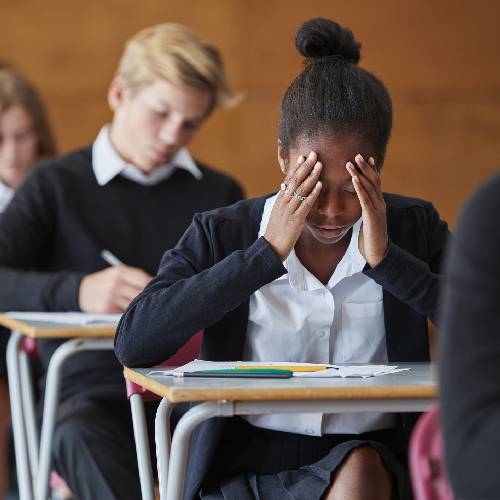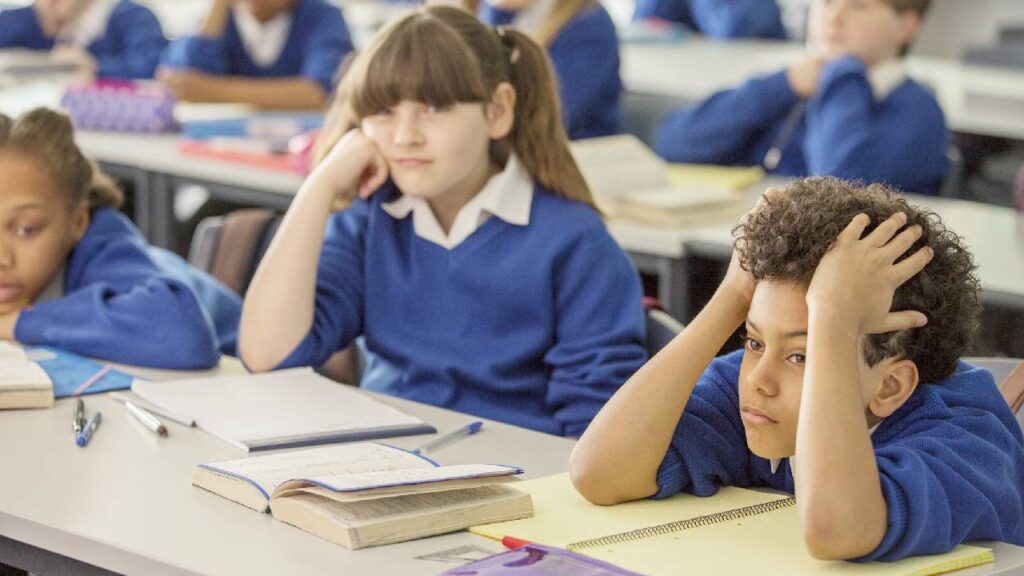Definition of Mental Health
Mental health, particularly student mental health, is a broad term that can include various conditions affecting the mental and emotional state of an individual. It is important to understand that mental health problems can affect anyone, including children and students. Mental health issues are common among young people, with approximately one in five children and adolescents experiencing some type of mental health disorder.
It is often difficult to recognise when someone may be struggling with their mental health, as symptoms vary greatly from person to person; however, some signs may include sudden changes in mood or behaviour, difficulty concentrating, self-harming behaviours, withdrawal from activities they used to enjoy and feelings of hopelessness or worthlessness. If you suspect a child or student may be struggling with their mental wellbeing it is important to seek help and mental health support from a qualified professional such as a doctor or psychologist who can provide support and treatment for the individual.
Causes of Mental Health Disorders
Mental health problems can have a wide range of causes. It’s likely that for many children and young people, there is a number of factors that can cause them to experience mental health issues.
Although it is to be noted that each individual young person’s mental health and wellbeing will require tailored support, spotting early signs and having early intervention can help the individual obtain mental health care.
What factors can affect young people's mental health?
The following factors could potentially result in a period of poor mental health for children and young people:
- childhood abuse, trauma, or neglect
- social isolation or loneliness
- bereavement (losing someone close to you)
- having a long-term physical health condition
- having a long-term illness
- moving home and/or changing schools
- being bullied in a school environment
- witnessing domestic violence
- exam stress (more so for high school students)
- negative school environment
- parents separating or divorcing

Depression and anxiety can often be attributed to a lack of positive relationships or strong social support networks. For example, when students experience bullying or rejection at school, they may struggle to cope with their emotions, leading to further mental health problems. For some other children, it might also be difficult to adapt to home life as they grapple with societal pressures such as academic success or fitting in with peers.
According to Mental Health.org, developing mental health issues can happen to children as young as 10, but aren’t clinically diagnosed as mental health conditions until the age of 14. Yet according to Mental Health.org, 70% of children and young people don’t have the appropriate mental health support or intervention earlier on in life. This is why mental health education and increasing mental health awareness in schools are essential for the early detection of potential mental ill health in young people and help children and young people to understand how to look out for their own wellbeing.
Signs of Mental Health in Children and Young People
Research from NHS England and leading mental health charities in the UK, such as Mind.org and Children’s Society.org have advised that since the start of the COVID-19 pandemic back in March of 2o2o mental health problems in young people have increased by 50%. Now an estimated five children (aged 5-16) in a classroom of 30 are likely to have mental health problems.
Unfortunately, the signs don’t always manifest until adulthood or even later in life, making it difficult to diagnose and treat mental illness in its earliest stages.
However, there are some warning signs that start to appear during childhood and adolescence that can alert parents and teachers to potential mental health issues.
It can be hard for adults to recognise early signs of mental illness in young people because they often lack the clarity of adult symptoms.
- Changes in eating or sleeping patterns
Drastic shifts in energy levels
Irritability or unexplained outbursts of anger
Difficulty concentrating on tasks or activities
Withdrawal from friends and family members
Avoiding social situations and extreme sensitivity to criticism
Concerned about body image
Importance of Mental Health in Schools
Research from NHS England and leading mental health charities in the UK, such as Mind.org and Children’s Society.org have advised that since the start of the COVID-19 pandemic back in March of 2o2o mental health problems in young people have increased by 50%. Now an estimated five children (aged 5-16) in a classroom of 30 are likely to have mental health problems.
Unfortunately, the signs don’t always manifest until adulthood or even later in life, making it difficult to diagnose and treat mental illness in its earliest stages.
However, there are some warning signs that start to appear during childhood and adolescence that can alert parents and teachers to potential mental health issues.
It can be hard for adults to recognise early signs of mental illness in young people because they often lack the clarity of adult symptoms.

Mental Health Awareness in Schools
Mental health awareness is an increasingly important issue for children and students everywhere, with one in five students facing mental health issues in 2023 according to the World Health Organisation. Addressing student mental health is crucial as it directly impacts their ability to learn and thrive in a school environment. Since young students and teens spend a large number of their formative years in schools, it’s essential that young people have access to the resources they need to take care of their mental wellbeing, and schools play a major part in this.
In order to create a safe and supportive learning environment, schools must invest in comprehensive mental health services for their students. By offering access to counselling, therapy, support groups, and other interventions tailored towards student needs, schools can make sure that no one has to suffer alone or go without assistance when it comes to mental health issues. Schools should also strive to create an atmosphere where conversations about mental health are open and empower students to seek help and wellbeing resources in an education setting.
It’s essential that all children feel supported in their educational journey, both academically and mentally, which is why it is vital we understand mental health and teach students about mental health in schools.
Mental health issues affect millions of people across the world, including both adults and children. Mental health concerns can have a profound effect on an individual’s quality of life and can even lead to serious physical illness if left untreated. It is therefore important for parents, teachers, and healthcare professionals alike to be aware of the potential causes that may contribute to mental health issues in children and students.
How Can a Whole School Approach Support Mental Health?
Mental health is an important part of our lives, no matter what age we are. It is especially important for children and students as they navigate their way through the world around them. The whole school community can play a vital role in supporting mental health for all those involved.
School leaders and school staff can create a safe and supportive environment for children and students to learn, grow and thrive in schools, which can make a huge difference in promoting good mental health.
This can be done effectively by offering resources such as:
Teach young people about mental health and emotional disorders
Providing mental health support in the form of counselling services to seek support
Extracurricular activities from physical activity, such as team and individual sports to performing arts clubs
Mental wellness classes or support groups can help provide guidance and understanding to those who may be struggling with their own mental health and wellbeing, as well as encourage dialogue around mental health.
Raising awareness and promoting mental health education through key dates, such as World Mental Health Day to increase mental health awareness in schools.
Additionally, encouraging open communication among teachers and students about any issues or struggles they may have can create a sense of acceptance throughout the student body.
Staff wellbeing and development are essential for promoting good mental health in schools. Teachers and school staff who feel supported and valued are more likely to be engaged in their work and create positive relationships with their students. Schools can support staff wellbeing and development by providing access to mental health support and resources, promoting a positive and inclusive culture, and encouraging physical activity and healthy lifestyles. By prioritising staff wellbeing and development, schools can create a positive and supportive environment that benefits both staff and students.
The curriculum plays a critical role in promoting mental health and wellbeing in schools. By incorporating mental health and wellbeing into the curriculum, schools can help students develop the skills and knowledge they need to manage their mental health and wellbeing. The Relationships, Sex and Health Education (RSHE) curriculum has a strong focus on mental health and wellbeing, and schools can use this as a starting point for promoting positive mental health and wellbeing. By teaching students about mental health and wellbeing, schools can help them develop a positive attitude towards learning and promote good mental health.
Children’s and young people’s mental health is only lightly touched on in teacher training, especially in secondary schools where students’ mental health needs are on the rise in this age group, given their increasing stress levels and potential for feeling overwhelmed.
As a result of this, the Department of Education (DfE) is offering a grant of £1,200 for eligible schools (state-funded) and colleges in England to train and appoint a specific mental health lead, in the same way, we have a literacy or PE lead. The training isn’t compulsory, but a growing number of schools are introducing Senior Mental Health Leads (SMHLs), who can provide advice and support to both staff and pupils when it comes to understanding, managing and improving their mental wellbeing.
Senior Mental Health Leads can make sure the curriculum stays focused on emotional wellbeing, key dates (mental health awareness week) and mental health literacy within the schools and colleges. SMHL would be able to suggest ways to adjust our operations at key times, like the idea of redeploying TAs when national exams are coming up to support staff and students. They act as a checkpoint and keep schools and colleges firmly on track with the strategy for supporting mental health proactively, not reactively.
These SMHL’s will usually have a background in psychology or counselling, as well as expertise in identifying signs of depression or anxiety. With an ethos of support, our school community can openly talk about what they find hard so we can help them before it gets worse.

How Can a Whole School Approach Support Mental Health?
There are many resources and tools available to support mental health and wellbeing in schools. These include:
- The SEARCH framework, a research-based Positive Education framework that helps schools develop interventions, whole-school wellbeing, and wellbeing curriculum.
- The Peer Education Project (PEP), a secondary school-based educational program that aims to equip young people with skills and knowledge to safeguard their mental health and that of their peers.
- Online learning and professional development courses, which provide a flexible and convenient way to learn about mental health and wellbeing.
- Mental health support teams, which provide additional capacity for early support and meeting the mental health needs of children and young people in primary, secondary, and further education settings.
- The Mix, a UK-based charity that provides free, confidential support for young people under 25.
- Shout 85258, a free, confidential, 24/7 text-messaging support service.
- Samaritans, a UK-based charity that provides support at any time, from any phone, for free.
- Young Minds, a mental health charity for children, young people, and their parents.
- Childline, a service that provides support for anyone under 19 in the UK.
By using these resources and tools, schools can promote positive mental health and wellbeing and support the mental health and wellbeing of their students.
Staff wellbeing and development are essential for promoting good mental health in schools. Teachers and school staff who feel supported and valued are more likely to be engaged in their work and create positive relationships with their students. Schools can support staff wellbeing and development by providing access to mental health support and resources, promoting a positive and inclusive culture, and encouraging physical activity and healthy lifestyles. By prioritising staff wellbeing and development, schools can create a positive and supportive environment that benefits both staff and students.
The curriculum plays a critical role in promoting mental health and wellbeing in schools. By incorporating mental health and wellbeing into the curriculum, schools can help students develop the skills and knowledge they need to manage their mental health and wellbeing. The Relationships, Sex and Health Education (RSHE) curriculum has a strong focus on mental health and wellbeing, and schools can use this as a starting point for promoting positive mental health and wellbeing. By teaching students about mental health and wellbeing, schools can help them develop a positive attitude towards learning and promote good mental health.
Children’s and young people’s mental health is only lightly touched on in teacher training, especially in secondary schools where students’ mental health needs are on the rise in this age group, given their increasing stress levels and potential for feeling overwhelmed.
As a result of this, the Department of Education (DfE) is offering a grant of £1,200 for eligible schools (state-funded) and colleges in England to train and appoint a specific mental health lead, in the same way, we have a literacy or PE lead. The training isn’t compulsory, but a growing number of schools are introducing Senior Mental Health Leads (SMHLs), who can provide advice and support to both staff and pupils when it comes to understanding, managing and improving their mental wellbeing.
Senior Mental Health Leads can make sure the curriculum stays focused on emotional wellbeing, key dates (mental health awareness week) and mental health literacy within the schools and colleges. SMHL would be able to suggest ways to adjust our operations at key times, like the idea of redeploying TAs when national exams are coming up to support staff and students. They act as a checkpoint and keep schools and colleges firmly on track with the strategy for supporting mental health proactively, not reactively.
These SMHL’s will usually have a background in psychology or counselling, as well as expertise in identifying signs of depression or anxiety. With an ethos of support, our school community can openly talk about what they find hard so we can help them before it gets worse.
Additional Information
Schools can get access to support in their schools through our recently launched course Awareness of Learner Wellbeing and also our Senior Mental Health Lead training.
Don’t forget to check out our ‘After The Bell’ podcast, which you can listen to on a weekly basis on Spotify or Apple Podcasts.
If you would like any more information, please do not hesitate to contact us by email at [email protected] or call 01253 543 660.

